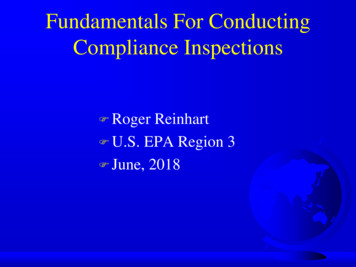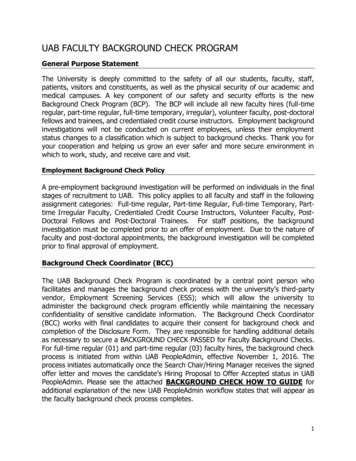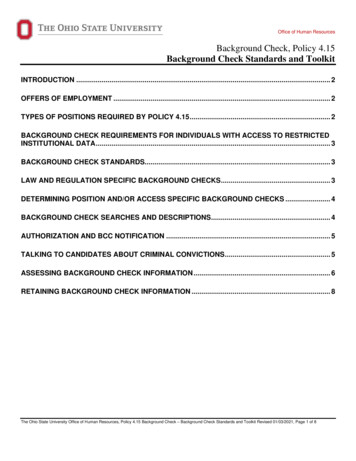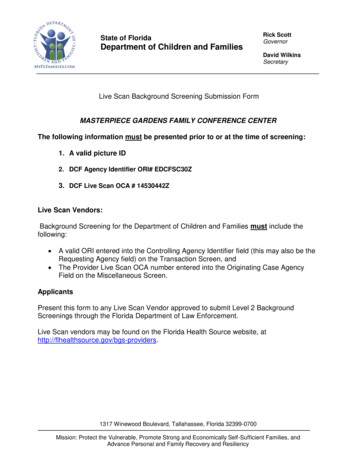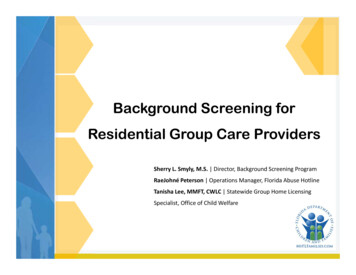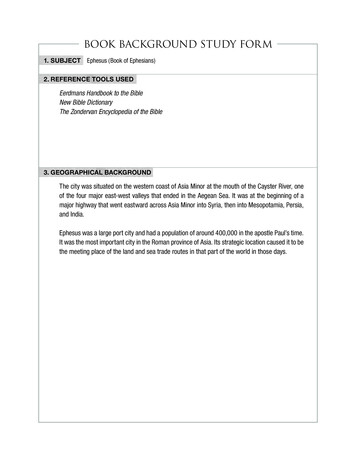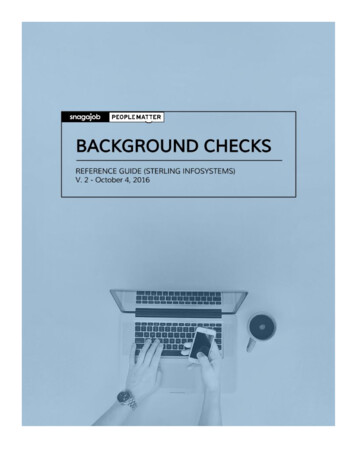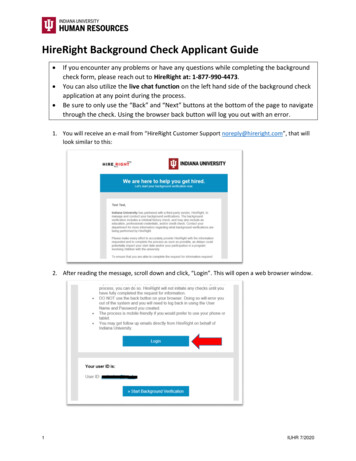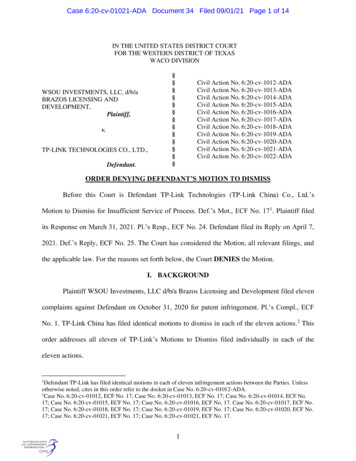
Transcription
Case 6:20-cv-01021-ADA Document 34 Filed 09/01/21 Page 1 of 14IN THE UNITED STATES DISTRICT COURTFOR THE WESTERN DISTRICT OF TEXASWACO DIVISIONWSOU INVESTMENTS, LLC, d/b/aBRAZOS LICENSING ANDDEVELOPMENT,Plaintiff,v.TP-LINK TECHNOLOGIES CO., LTD.,Defendant.§§§§§§§§§§§§§Civil Action No. 6:20-cv-1012-ADACivil Action No. 6:20-cv-1013-ADACivil Action No. 6:20-cv-1014-ADACivil Action No. 6:20-cv-1015-ADACivil Action No. 6:20-cv-1016-ADACivil Action No. 6:20-cv-1017-ADACivil Action No. 6:20-cv-1018-ADACivil Action No. 6:20-cv-1019-ADACivil Action No. 6:20-cv-1020-ADACivil Action No. 6:20-cv-1021-ADACivil Action No. 6:20-cv-1022-ADAORDER DENYING DEFENDANT’S MOTION TO DISMISSBefore this Court is Defendant TP-Link Technologies (TP-Link China) Co., Ltd.’sMotion to Dismiss for Insufficient Service of Process. Def.’s Mot., ECF No. 171. Plaintiff filedits Response on March 31, 2021. Pl.’s Resp., ECF No. 24. Defendant filed its Reply on April 7,2021. Def.’s Reply, ECF No. 25. The Court has considered the Motion, all relevant filings, andthe applicable law. For the reasons set forth below, the Court DENIES the Motion.I. BACKGROUNDPlaintiff WSOU Investments, LLC d/b/a Brazos Licensing and Development filed elevencomplaints against Defendant on October 31, 2020 for patent infringement. Pl.’s Compl., ECFNo. 1. TP-Link China has filed identical motions to dismiss in each of the eleven actions.2 Thisorder addresses all eleven of TP-Link’s Motions to Dismiss filed individually in each of theeleven actions.1Defendant TP-Link has filed identical motions in each of eleven infringement actions between the Parties. Unlessotherwise noted, cites in this order refer to the docket in Case No. 6:20-cv-01012-ADA.2Case No. 6:20-cv-01012, ECF No. 17; Case No. 6:20-cv-01013, ECF No. 17; Case No. 6:20-cv-01014, ECF No.17; Case No. 6:20-cv-01015, ECF No. 17; Case No. 6:20-cv-01016, ECF No. 17. Case No. 6:20-cv-01017, ECF No.17; Case No. 6:20-cv-01018, ECF No. 17; Case No. 6:20-cv-01019, ECF No. 17; Case No. 6:20-cv-01020, ECF No.17; Case No. 6:20-cv-01021, ECF No. 17; Case No. 6:20-cv-01021, ECF No. 17.1
Case 6:20-cv-01021-ADA Document 34 Filed 09/01/21 Page 2 of 14WSOU is a Delaware corporation with its principal place of business at 605 AustinAvenue, Suite 6, Waco, Texas 76701. Pl.’s Compl. at ¶ 5. WSOU offers services to patentholders such as license negotiation and management of infringement litigation. Id. at ¶2. WSOUclaims that TP-Link China makes, uses, offers for sale, or imports computer networking productsthat infringe eleven different patents. Id. at ¶ 8.TP-Link China is a Chinese corporation with its principal place of business located atSouth Building, No. 5 Keyuan Road, Science and Technology Park, Nanshan District, Shenzhen,Peoples Republic of China. Id. at ¶ 6. The eleven Complaints allege patent infringement ofeleven different United States patents which relate to varying technologies.3 Id. at ¶ 15. WSOUalleges that TP-Link China has committed these acts of infringement in the Western District ofTexas.4 Id. at ¶ 5. WSOU also alleges that TP-Link Technologies Co., Ltd. may be served withprocess by serving the Texas Secretary of State, James E. Rudder Building, 1019 Brazos Street,Austin, Texas 78701, as its agent for service because it engages in business in Texas but has notdesignated or maintained a resident agent for service of process in Texas as required by statute.Id. at ¶ 7.On November 9, 2020, WSOU filed Motions for Alternative Service under Rule 4(f)(3)in all eleven cases, which the Court initially denied on November 12, 2020.5 Order Denying Pl.’sMot. for Leave to Effect Alt. Serv. On November 17, 2020, Plaintiff filed Motions forReconsideration for Leave to Effect Alternative Service, claiming that the alternative service3In Case No. 6:20-cv-1012, WSOU asserts U.S. Patent No. 7,174,180; In Case No. 6:20-cv-1013, WSOU assertsU.S. Patent No. 9,226,305; In Case No. 6:20-cv-1014, WSOU asserts U.S. Patent No. 7,751,423;In Case No. 6:20-cv-1015, WSOU asserts U.S. Patent No. 8,094,573; In Case No. 6:20-cv-1016, WSOU assertsU.S. Patent No. 8,199,636; In Case No. 6:20-cv-1017, WSOU asserts U.S. Patent No. 7,965,726; In Case No. 6:20cv-1018, WSOU asserts U.S. Patent No. 7,447,767; In Case No. 6:20-cv-1019, WSOU asserts U.S. Patent No.7,333,770; In Case No. 6:20-cv-1020, WSOU asserts U.S. Patent No. 8,774,790; In Case No. 6:20-cv-1021, WSOUasserts U.S. Patent No. 9,548,977; In Case No. 6:20-cv-1022, WSOU asserts U.S. Patent No. 7,652,988.4The asserted patents and WSOU’s claim for infringement of each of the asserted patents are discussed fully inWSOU’s complaints in each of the eleven actions.5Case Nos. 6:20-cv-01012, -13, -14, -15, -16, -17, -18, -19, -20, -21, and -22-ADA.2
Case 6:20-cv-01021-ADA Document 34 Filed 09/01/21 Page 3 of 14requested was reasonably calculated under all circumstances to apprise the Defendant of thependency of the action and afford Defendant an opportunity to be heard based on the Court’sdecision in STC.UNM v. Taiwan Semiconductor Mfg. Co. Ltd., No. 6:19-cv-00261-ADA, 2019U.S. Dist. LEXIS 231994, at *3 (W.D. Tex. May 29, 2019). Pl.’s Mot. at 3.Plaintiff requested leave to serve process (1) via email to TP-Link China’s former U.S.counsel; and (2) via “Certified Mail” to TP-Link Technologies USA Corporation, the domesticsubsidiary of TP-Link China, located at 145 S State College Blvd, STE 400, Brea, California92821. Pl.’s Mot. at 2, ECF No. 10. WSOU requested to effect service of process by emailingDefendant’s previous U.S. counsel: Attorney Stephen R. Smerek at ssmerek@foley.com andAttorney Tiffany K. Sung at tsung@foley.com. In its Motion, Plaintiff stated that AttorneysSmerek and Sung represented Defendant in the United States as recently as April 23, 2020 in theEastern District of Texas and are attorneys at Foley & Lardner LLP. Pl.’s Mot. at 2. The Courtgranted Plaintiff’s Motion for Reconsideration on December 7, 2020.6 Order Granting Pl.’s Mot.for Reconsideration. Plaintiff subsequently sent emails to Attorneys Smerek and Sung, andadditionally served process via Certified Mail with Electronic Delivery Confirmation to TP-LinkUSA. Pl.’s Summons, ECF No. 12.On December 12, 2020, WSOU filed eleven returned executed Summonses, havingeffectuated alternate service of process according to the methods requested in its Motion. Pl.’sSummons. On December 18, 2020, Foley filed a Notice of Non-Representation with the Court,having previously sent an email response to Plaintiff that Foley did not represent TP-Link China.Not. of Non-Representation, ECF No. 13. On February 26, 2021, Defendant specially appeared6In case nos. 6:20-cv-01012, -13, -14, -15, -16, -17, -18, -19, -20, -21, and -22-ADA.3
Case 6:20-cv-01021-ADA Document 34 Filed 09/01/21 Page 4 of 14and filed this Motion to Dismiss due to invalid service of process and, therefore, lack of personaljurisdiction. Def.’s Mot., ECF No. 17.Defendant now moves for dismissal pursuant to Federal Rules of Civil Procedure12(b)(2) and 12 (b)(5). Id.For the reasons discussed below, the Court finds that Plaintiff adequately servedDefendant via alternative service as authorized by the Court.II. LEGAL STANDARDService of process on a foreign defendant must comply with: (1) the Federal Rules ofCivil Procedure; (2) international agreements entered into by the United States and the relevantforeign country; and (3) the due process protections afforded by the United States Constitution.A. Federal Rules of Civil ProcedureIn reviewing the Rule 12 motion, the district court accepts all well-pleaded facts as trueand views the facts in light most favorable to the plaintiff. Fed. R. Civ. P. 12(h); Lisson v. INGGROEP N.V., 262 F. App'x 567, 570 (5th Cir. 2007).1. Personal JurisdictionFor the Court to have personal jurisdiction, a defendant must be properly servedconsistent with the United States Constitution and laws. Fed. R. Civ. P. 4(k). A non-residentdefendant must maintain its objection to personal jurisdiction while participating in litigationwithout submitting to the court’s jurisdiction. Halliburton Energy Servs., Inc. v. IronshoreSpecialty Ins. Co., 921 F.3d 522, 540 (5th Cir. 2019). A court has personal jurisdiction over aparty when that party has established such contacts with the state that the form of substitutedservice adopted there gives reasonable assurance that the notice will be actual. Int'l Shoe Co. v.State of Wash., Off. of Unemployment Comp. & Placement, 326 U.S. 310, 320, 66 S. Ct. 154, 90L. Ed. 95 (1945).4
Case 6:20-cv-01021-ADA Document 34 Filed 09/01/21 Page 5 of 142. Alternative ServiceIn addition to means of service authorized by the Hague Service Convention, a court mayallow service of process on foreign defendants according to Fed. R. Civ. P. 4(f)(3) “by othermeans not prohibited by international agreement.” Fed. R. Civ. P. 4(f)(1). Rule 4(f)(3) is notsubsumed within or in any way dominated by Rule 4(f)’s other subsections; it standsindependently on equal footing. Nuance Commc'ns, Inc. v. Abbyy Software House, 626 F.3d1222 (Fed. Cir. 2010). Rule 4(f)(3) permits a party to use an alternative method of service if theparty (1) obtains permission of the court and (2) the method is not otherwise prohibited byinternational agreement. Fed. R. Civ. P. 4(f)(3). So long as the method of service is notprohibited by international agreement, the Court has considerable discretion to authorize analternative means of service. Terrestrial Comms LLC v. NEC Corp., No. 6:19-CV-00597-ADA,2020 U.S. Dist. LEXIS 110983, at *3–4 (W.D. Tex. June 24, 2020).B. The Hague Service ConventionService of process on a foreign defendant pursuant to the Hague Service Convention(“Hague Convention”) is mandatory only if the method of serving process involves thetransmittal of documents abroad. Sheets v. Yamaha Motors Corp., U.S.A., 891 F.2d 533, 537 (5thCir. 1990). In other words, if a foreign defendant can be served under state law withouttransmitting documents abroad, the Hague Convention is inapplicable. VolkswagenwerkAktiengesellschaft v. Schlunk, 486 U.S. 694, 707, 108 S. Ct. 2104, 100 L. Ed. 2d 722 (1988). TheHague Convention does not preempt methods of service on domestic agents that are valid understate law or constitutional requirements of due process. Id. at 707. For plaintiffs that requestleave to effectuate alternate service of process, service under Rule 4(f)(3) is equally asacceptable as complying with the Court’s authorization by adhering to the Texas long-arm5
Case 6:20-cv-01021-ADA Document 34 Filed 09/01/21 Page 6 of 14statute or Constitutional due process. See McBride v. Wille, No. SA-13-CV-0986-DAE, 2013U.S. Dist. LEXIS 195513, at *5 (W.D. Tex. Dec. 2, 2013).7C. Constitutional Due ProcessWhen a court authorizes alternate service of process, the plaintiff’s request is analyzedthrough traditional notions of due process, satisfied when efforts at giving notice providefundamental fairness by exhibiting a reasonable probability of actual notice. Terrestrial, 2020U.S. Dist. LEXIS 110983 at *6. The due process analysis determines whether traditional notionsof fair play and substantial justice have been offended when asserting personal jurisdiction over adefendant. Burnham v. Superior Ct. of California, Cty. of Marin, 495 U.S. 604, 622, 110 S. Ct.2105, 109 L. Ed. 2d 631 (1990).Because the claims were brought in the Western District of Texas, an alternative methodof service of process is valid if it complies with Texas’s long-arm statute. The Texas long-armstatute is interpreted to reach as far as the federal constitutional requirements of due process willallow. Terrestrial, 2020 U.S. Dist. LEXIS 110983 at *7.An aspect of due process is ensuring that alternate methods of service of process comportwith the principle of comity. Kreimerman v. Casa Veerkamp, S.A. de C.V., 22 F.3d 634, 643–44(5th Cir. 1994). Because determinations regarding alternate service under Federal Rule of CivilProcedure 4(f)(3) are conferred to the discretion of the Court, a district court can directalternative means of service that comply with due process without violating principles of comity.See James Avery Craftsman, Inc. v. Sam Moon Trading Enters., No. SA-16-cv-00463-OLG,2018 U.S. Dist. LEXIS 219083, at *8 (W.D. Tex. July 5, 2018).7See also Brookshire Bros. v. Chiquita Brands Int’l, Inc., No. 05CIV21962COOKEBROWN, 2007 WL 1577771, at*2 (S.D. Fla. May 31, 2007); RSM Prod. Corp. v. Fridman, No. 06 CIV. 11512(DLC), 2007 WL 2295907, at *6(S.D.N.Y. Aug. 10, 2007); LG Elecs., Inc. v. ASKO Appliances, Inc., No. CIV.A.08-828 (JAP), 2009 WL 1811098,at *4 (D. Del. June 23, 2009).6
Case 6:20-cv-01021-ADA Document 34 Filed 09/01/21 Page 7 of 14III.ANALYSIS8Defendant asserts four main arguments as to why Plaintiff’s alternative methods ofservice of process on Defendant, while authorized by this Court, were still improper: (1) Plaintiffcannot avoid the Hague Convention; (2) Plaintiff’s alternative service is invalid under FederalRule of Civil Procedure 4(f)(3); (3) Plaintiff’s mail service is invalid because Plaintiff failed toobtain a signed return receipt as required by Texas law; and (4) the principle of comity alsoinsists that Plaintiff’s service be found invalid. Def.’s Mot. The Court will address eachargument in turn.A. “Plaintiff Cannot Avoid the Hague Convention”Defendant first asserts that Texas law mandates service on a foreign entity through theHague Convention. Def.’s Mot. at 6. Specifically, Defendant claims that the Texas long-armstatute requires that process and notice of service be mailed abroad and that such a requirementtriggers the Hague Convention. See Def.’s Mot. at 7 (“The Texas long-arm statute, throughSections 17.043 and 17.045, requires ‘a copy of the process and notice of the service must beimmediately mailed to the nonresident or the nonresident’s principal place of business.’” (citingTex. Civ. Prac. & Rem. Code Ann. §§ 17.043, 17.045)).Defendant’s interpretation of the Texas long-arm statute mandates that all foreigndefendants only be served through the Hague Convention. Such a reading on its face is clearlyerroneous as evidenced by the volumes of Texas state cases involving valid service of process onforeign entities through means other than the Hague Convention. See e.g., Redwood Grp., L.L.C.8As a threshold matter, when a Rule 12 motion fails to assert lack of personal jurisdiction, improper venue, orsufficient process, the defendant waives those defenses. See Fed. R. Civ. P. 12(h); West v. Velo Enter. Co., No. 5:13CV-00024-OLG, 2013 U.S. Dist. LEXIS 203330, at *4–5 (W.D. Tex. Aug. 29, 2013). In reviewing the Rule 12motion, the district court accepts all well-pleaded facts as true and views the facts in light most favorable to theplaintiff. Lisson, 262 F. App'x at 570. TP-Link China appears specially in this litigation to object to proceedingunder ineffective service and thus lack of personal jurisdiction. Def.’s Mot. The Court finds that TP-Link China haspreserved its objection.7
Case 6:20-cv-01021-ADA Document 34 Filed 09/01/21 Page 8 of 14v. Louiseau, 113 S.W.3d 866, 870 (Tex. App. 2003) (outlining when the secretary of state canfunction as an agent for service of process when there is no other designated agent); Pub.Storage Properties, VII, Ltd. v. Rankin, 678 S.W.2d 590, 592 (Tex. App. 1984) (stating when thesecretary of state can function as an agent for service of process when the foreign defendantengages in busines in the state, irrespective of resident agents); Matter of Marriage of Sandoval,619 S.W.3d 716, 724 n.1 (Tex. 2021) (listing other manners for service of process other than theHague Convention).This Court, along with several of its sister courts, has also been clear in holding that theTexas long-arm statute does not require transmittal of documents abroad when serving a foreigndefendant. Terrestrial Comms LLC v. NEC Corp., No. 6-20-CV-00096-ADA, 2020 WL3452989, at *3 (W.D. Tex. June 24, 2020) (citing Fundamental Innovation Sys. Int'l, LLC v. ZTECorp., No. 3:17-CV-01827-N, 2018 WL 3330022, at *3 (N.D. Tex. Mar. 16, 2018). Courts haverepeatedly interpreted the Texas long-arm statute “to reach as far as the federal constitutionalrequirements of due process will allow.” CSR Ltd. v. Link, 925 S.W.2d 591, 594 (Tex.1996); Guardian Royal Exch. Assur., Ltd. v. Eng. China Clays, P.L.C., 815 S.W.2d 223, 226(Tex. 1991); U-Anchor Advert., Inc. v. Burt, 553 S.W.2d 760, 762 (Tex. 1977).To satisfy the constitutional requirements of due process, and likewise the Texas longarm statute, the method of service must be “reasonably calculated, under all the circumstances, toapprise interested parties of the pendency of the action and afford them an opportunity to presenttheir objections.” Mullane v. Cent. Hanover Bank & Tr. Co., 339 U.S. 306, 314, 70 S. Ct. 652,94 L. Ed. 865 (1950). Constitutional due process is satisfied when efforts at giving noticeprovide fundamental fairness by exhibiting a reasonable probability of actual notice. Id. at 317–8
Case 6:20-cv-01021-ADA Document 34 Filed 09/01/21 Page 9 of 1418. Constitutional due process does not require transmittal of documents abroad to provide noticeto a defendant. See Volkswagenwerk Aktiengesellschaft, 486 U.S. at 707.Additionally, Defendant quotes Texas Civil Practice and Remedies Code sections 17.043and 17.045 as required methods of service. However, sections 17.043 and 17.045 are permissivemethods of service as evidenced by the clear permissive language “process may be served . . .”;“(a) if the secretary of state is served . . . (c) if the person in charge . . . (d) the process of noticemust be sent by registered mail or by certified mail . . .” Tex. Civ. Prac. & Rem. Code Ann. §§17.043, 17.045. It is clear that the Texas Civil Practice and Remedies Code and the Texas longarm statute do not require transmittal of documents abroad.Direct “service pursuant to Hague Convention procedures is required only if the methodof serving process involves the transmittal of documents abroad.” Sheets v. Yamaha MotorsCorp., U.S.A., 891 F.2d 533, 537 (5th Cir. 1990); see also Volkswagenwerk Aktiengesellschaft,486 U.S. at 707 (“The only transmittal to which the Convention applies is a transmittal abroadthat is required as a necessary part of service.”). Defendant also cites Schlunk to support itsstatement that “[o]nce triggered, compliance with the Hague Convention is mandatory.” Def.’sMot. at 7 (citing Volkswagenwerk Aktiengesellschaft, 486 U.S. at 700). However, as statedabove, the Court finds that transmittal of documents abroad is not required under the Texas longarm statute; therefore, the Hague Convention has not been “triggered” in the instant case.Additionally, here, “alternative means to effectuate service exist, [so] strict compliance with theservice requirements under the Hague Convention is not mandatory.” Brown v. China IntegratedEnergy, Inc., 285 F.R.D. 560, 564 (C.D. Cal. 2012).9
Case 6:20-cv-01021-ADA Document 34 Filed 09/01/21 Page 10 of 14Therefore, the Court finds that the Texas long-arm statute does not require transmittal ofdocuments abroad and service of process on a foreign defendant is not restricted to only themethods of service authorized by the Hague Convention.B. “Plaintiff’s Alternative Service Is Also Invalid Under Rule 4(f)(3)”A non-resident defendant must be properly served according to Federal Rules of CivilProcedure Rules 4(h) and 4(f) to be subject to personal jurisdiction. First, Rule 4(h) states“unless federal law provides otherwise . . . a foreign corporation . . . must be served in a judicialdistrict of the United States or at a place not within any judicial district of the United States, inany manner prescribed by Rule 4(f) for serving an individual”. Fed. R. Civ. P. 4(h) (emphasisadded). Second, Rule 4(f)(1) states “unless federal law provides otherwise, an individual . . . maybe served . . . by any internationally agreed means of service that is reasonably calculated to givenotice, such as those authorized by the Hague Convention on the Service Abroad of Judicial andExtrajudicial Documents.” Fed. R. Civ. P. 4(f)(1) (emphasis added). In addition to means ofservice authorized by the Hague Convention, a court may allow service of process on foreigndefendants “by other means not prohibited by international agreement.” Fed. R. Civ. P. 4(f)(1).Finally, Federal Rule of Civil Procedure 4(f)(3) permits a party to use an alternative method ofservice if the party (1) obtains permission of the court and (2) the method is not otherwiseprohibited by international agreement. Fed. R. Civ. P. 4(f)(3).Defendant argues that even if the Texas long-arm statute does not “trigger the HagueConvention,” Plaintiff’s methods of service of process are invalid under Rule 4(f)(3) “becausethey are service within the United States.” Def.’s Mot. at 1. However, as Plaintiff argues, a partyis not required to attempt to effect service on a foreign defendant pursuant to the Hagueconvention under Rule 4(f)(1) prior to requesting the Court’s authorization of an alternative10
Case 6:20-cv-01021-ADA Document 34 Filed 09/01/21 Page 11 of 14method of service under Rule 4(f)(3). Pl.’s Resp. at 5. When a plaintiff requests and a Courtgrants alternate service of process, service of process using a method not prohibited byinternational agreement comports with principles of due process. Terrestrial, 2020 U.S. Dist.LEXIS 110983 at *4. The Court has considerable discretion to authorize an alternative means ofservice. Id. at *5.While the text of Rule 4(f)(3) does state that an individual “may be served at a place notwithin any judicial district of the United States,” courts around the country have held that “the‘proper construction’ of Rule 4(f)(3) vis-à-vis foreign defendant includes service via ‘deliver tothe defendant’s attorney.’” Compañía Compania de Inversiones Mercantiles, S.A. v. GrupoCementos de Chihuahua S.A.B. de C.V., 970 F.3d 1269, 1295 (10th Cir. 2020). If a plaintiff hasevidence of an attorney-client relationship between a foreign defendant and domestic counsel, acommon method of alternate service is service of process on a defendant’s United States basedattorney. See In re Potash Antitrust Litig., 667 F. Supp. 2d 907, 931 (N.D. Ill. 2009)9. Byeffecting service of process on a corporation’s known United States-based counsel, a corporationis reasonably certain to be apprised of the pending actions, if it is not already aware of them.Terrestrial, 2020 U.S. Dist. LEXIS 110983 at *10–11; STC.UNM, 2019 U.S. Dist. LEXIS231994, at *6. A court has personal jurisdiction over a party when that party has established suchcontacts with the state that the particular form of substituted service adopted there givesreasonable assurance that the notice will be actual. International Shoe Co., 326 U.S. at 320.This Court granted Plaintiff’s Motion for Leave to Effect Alternative Service and orderedan alternative method of service of process. Order Granting Pl.’s Mot. for Leave to Effect Alt.Serv. Here, TP-Link China is a non-resident defendant with a domestic subsidiary and domestic9See also Brookshire Bros., 2007 WL 1577771, at *2; RSM Production Corp., 2007 WL 2295907, at *6; LGElectronics, Inc., 2009 WL 1811098, at *4.11
Case 6:20-cv-01021-ADA Document 34 Filed 09/01/21 Page 12 of 14U.S.-based counsel. See Pl.’s Resp. at 4. Additionally, Defendant claims there is no factual issueto dispute regarding the method of service effectuated by Plaintiff. Def.’s Reply in Support of itsMotion to Defer Entry at 5, ECF No. 22. Both parties agree that Plaintiff emailed Foley attorneysand mailed TP-Link USA via USPS. Pl.’s Resp. at 10. These alternative methods of service ofprocess satisfy Rule 4(f)(3) and constitutional due process because they are reasonably calculatedto apprise Defendant of the complaint filed against it. In summary, Plaintiff’s alternate service ofprocess on Defendant complies with Federal Rule of Civil Procedure 4(f)(3) because thealternate service was Court ordered.C. “Plaintiff’s Mail Service is Invalid Because Plaintiff Failed to Obtain a Signed ReturnReceipt as Required by Texas Law”Plaintiff argues that service via certified mail did not comport with Texas law because thereturn receipt did not include a signature from anyone required under Texas law. Def.’s Mot. at12. As such, it believes such a failing is fatal. See id. at 13. Plaintiff also believes that thismethod of service is relevant because this method was ordered by the Court along with servicevia email. Id. at 13 n.17. However, it is clear from Plaintiff’s briefing for its Motion for AlternateService that certified mail and email were proposed as disjunctive options, not conjunctive ones.Motion for Leave to Effect Alternate Service, ECF No. 10 (“Plaintiff also respectfully requests,as an additional method, or in the alternative, for leave to effect service upon Defendants throughTP-Link’s U.S. subsidiary TP-Link USA Corporation, 145 S. State College Blvd. Suite 400,Brea, California 92821.”). As discussed above, service of process via email alone is sufficient.Accordingly, the Court finds this point moot.D. “The Principle of Comity Also Insists That Plaintiff’s Service Be Found Invalid”Another aspect of constitutional due process is ensuring that alternate methods of serviceof process comport with the principle of comity. See Kreimerman, 22 F.3d at 643–44. Principles12
Case 6:20-cv-01021-ADA Document 34 Filed 09/01/21 Page 13 of 14of comity are a matter of the court’s discretionary power to determine whether a plaintiff hascomplied with due process in its efforts to secure service of process upon a foreign defendant.See UNM Rainforest Innovations v. D-Link Corp., No. 6-20-CV-00143-ADA, 2020 WL3965015, at *4 (W.D. Tex. July 13, 2020). However, plaintiffs assume the risk that the principleof international comity might hinder their establishment of jurisdiction over defendants. Id. As aresult of seeking service of process through a method that bypasses the Hague Convention,plaintiffs may also discover that their failure to employ the Convention’s safe harbor proceduresmakes enforcement of their judgments abroad more difficult. Id.Here, Plaintiff requested alternate service of process on a Chinese defendant throughemail to its known and recent domestic U.S. counsel which does not trigger obligations under theHague Convention, so the principle of comity is not offended. The principle of internationalcomity refers to the spirit of co-operation in which a domestic tribunal approaches the resolutionof cases touching the laws and interests of other sovereign states. Societe Nationale IndustrielleAerospatiale v. U.S. Dist. Ct. for S. Dist. of Iowa, 482 U.S. 522, 524, 107 S. Ct. 2542, 96 L. Ed.2d 461 (1987).However, the principle of comity does not require plaintiffs to resort to HagueConvention procedures without assessing the particular facts, sovereign interests, and likelihoodthat resort to those procedures will prove effective in each case. Id. WSOU has filed itscomplaint in the Western District of Texas, alleging eleven U.S. Patents have been infringedupon in the United States by TP-Link China. Pl.’s Mot. at 2. It is Plaintiff’s choice, as theplaintiff is the master of its own Complaint, where to seek adjudication of its claim, dependingon what its goals are. See Caterpillar Inc. v. Williams, 482 U.S. 386, 395, 107 S. Ct. 2425, 96 L.Ed. 2d 318 (1987). This consideration is significant, as this Court has consistently found13
Case 6:20-cv-01021-ADA Document 34 Filed 09/01/21 Page 14 of 14plaintiffs’ interests outweighed concerns of prudential comity. See UNM Rainforest Innovations,2020 WL 3965015, at *4; Terrestrial Comms LLC, 2020 WL 3452989, at *2. WSOU hasdetermined that judgment from the U.S. District Court for the Western District of Texas will bebest for its case, in consideration of its respective interests. As such, the Court finds that theprudential comity does not weigh towards finding the method of service invalid.IV.CONCLUSIONThe Court is reasonably assured that Plaintiff’s methods of service satisfy theconstitutional requirements of notice and due process. Plaintiff’s effort to serve Defendant byemail was not the only form of service attempted, and Plaintiff made reasonable efforts to seekvalid forms of service that conformed with Federal Rules of Civil Procedure and other prudentialconcerns. As such, and for the reasons given by the Court, Defendant’s Motion to Dismiss isDENIED.SIGNED this 1st day of September, 2021.ALAN D ALBRIGHTUNITED STATES DISTRICT JUDGE14
Terrestrial, 2020 U.S. Dist. LEXIS 110983 at *10-11; STC.UNM, 2019 U.S. Dist. LEXIS 231994, at *6. A court has personal jurisdiction over a party when that party has established such contacts with the state that the particular form of substituted service adopted there gives reasonable assurance that the notice will be actual.
